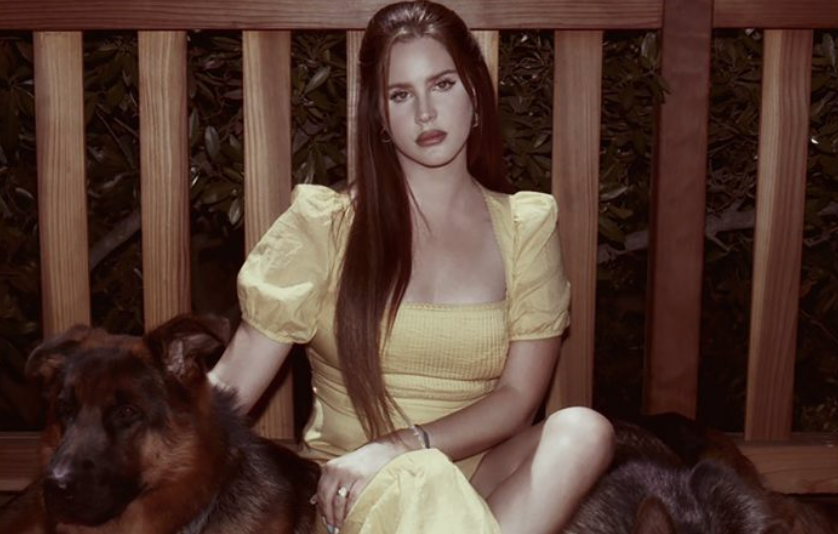‘Blue Banisters’ attempts to resurrect and redeem

Lana Del Rey released her eighth studio album on Friday titled “Blue Banisters.” The album follows the early 2021 release of her album “Chemtrails Over The Country Club,” as well as a streak of controversy surrounding the pop singer.
From degrading insinuations about women-identifying artists of color posted on her social media to a seemingly negligent approach to coronavirus safety, Del Rey’s reputation has seen a sharp decline following the career-high praise of her 2019 album “Norman Fucking Rockwell.”
The string of controversies was made worse by Del Rey’s apparent need to over explain, the multitude of stubborn attempts to defend herself, often backfiring into further damage.
“Blue Banisters” may be an extension to the explanation, sharpened by its plea for listeners to see through the muck of controversy and into what Del Rey deems her well-intentioned soul.
The album features a handful of songs written years prior, which have been teased in leaked snippets on Tumblr or Instagram videos that were later deleted. Four of the album’s tracks were written in 2013 and 2014, recorded for but ultimately left off of “Ultraviolence,” Del Rey’s third studio album.
Del Rey’s inclusion of songs from a previous era of her music seems to be an attempt to call fans back to a time when their respect for her was still high, like scattered proof that an unproblematic Lana had existed before this new, highly-criticized one.
The old songs are snuck into a 15-song tracklist that also features an abundance of new work. These new songs scream of the frustrations and anxieties that have resulted from years in the spotlight with more striking emotion and deeper glimpses into the artist’s personal life than has been seen in any of her previous work.
Unlike the gilded Hollywood aesthetic of Del Rey’s early albums, “Blue Banisters” brings a lens to the personal struggles we haven’t been allowed to see before. The inclusion of such intimate details is Del Rey’s method of rejecting the conclusions drawn from her various controversies, insisting instead on her “true” persona as presented in the album.
In “Wildflower Wildfire,” Del Rey confesses to problems she experienced in her youth with her mother, which led to Del Rey’s hospitalization and a subsequent numbing from lithium medication. The song likens Del Rey to a persistent wildflower, while expressing a hope that she may never grow into something destructive: “Baby, I’ll be like a wildflower / I live on sheer willpower / I’ll do my best never to turn into something / That burns, burns, burns.”
In “Arcadia,” Del Rey claims her love for Los Angeles but admits to the hardships she’s had to navigate since falling in love with the city, ultimately ending with a decision to leave it behind.
“They built me up three-hundred feet tall just to tear me down / so I’m leavin’ with nothing but laughter and this town,” says Del Rey before tossing in a petty addendum to round out the song: “I’m leavin’ them as I was, five-foot-eight Western belt / plus the hate that they gave / by the way, thanks for that.”
The titular track “Blue Banisters” expresses Del Rey’s anxieties about life as an artist as well as fears for the world in general. Over the steady deep notes of a simple piano accompaniment, Del Rey sings, “You can’t be a muse and be happy, too.” She then squeezes out, in a more timid voice, “And that scared me.”
Later in the song, Del Rey breaks from the timidness and lets escape a plainly stated fear, nearly strangled with emotion: “I’m scared of the Santa Clarita Fires / I wish that it would rain.”
Del Rey releases a rawness of emotion into “Blue Banister’s” vocals that has not been seen in her earlier works, further exemplifying her desire to be truly seen through the album.
In “Black Bathing Suit,” Del Rey expresses her frustration with the criticism she’s received through vocal twists that emerge jarringly in the outro. “Oh, let ‘em talk about me!” she cries from a distance, then closer, louder and nearly sobbing: “Mail me when you get the blues.”
The most striking emotion comes from “Dealer,” a duet with artist Miles Kane that bemoans a toxic relationship with a dealer. Though Kane commandeers the verses, Del Rey enters for a striking chorus, her voice taking charge easily with its jolting abundance of emotion.
The lyrics, though assumedly pointed at the dealer, could be interpreted as written for Del Rey’s critics, as if she is yelling her extreme frustrations directly at them: “I don’t want to live! / I don’t want to give you nothing / ‘Cause you never give me nothing back. / Why can’t you be good for something? / Not one shirt off your back.” The emotion packed into Del Rey’s voice throughout the album is remarkable in its versatility. From the anguish of “Dealer” to the dry sarcasm of “Sweet Carolina,” Del Rey proves with “Blue Banisters” just how well she can express the tumultuousness of her feelings in her music.
“Blue Banisters” attempts to convince a diminishing fan base that the old Lana Del Rey still exists beneath the controversy and that the present one is a complex person with real struggles and good intentions. But if the album succeeds at anything, it’s proving Del Rey’s vocal power and lyrical poetics, which have maintained prevalence through eight albums.
Wrongdoings not forgotten, the album speaks adeptly to the ever-evolving mythology surrounding an artist who, flaws and glamour and all, continues to reinstate herself as an American music icon, for better or for worse.

